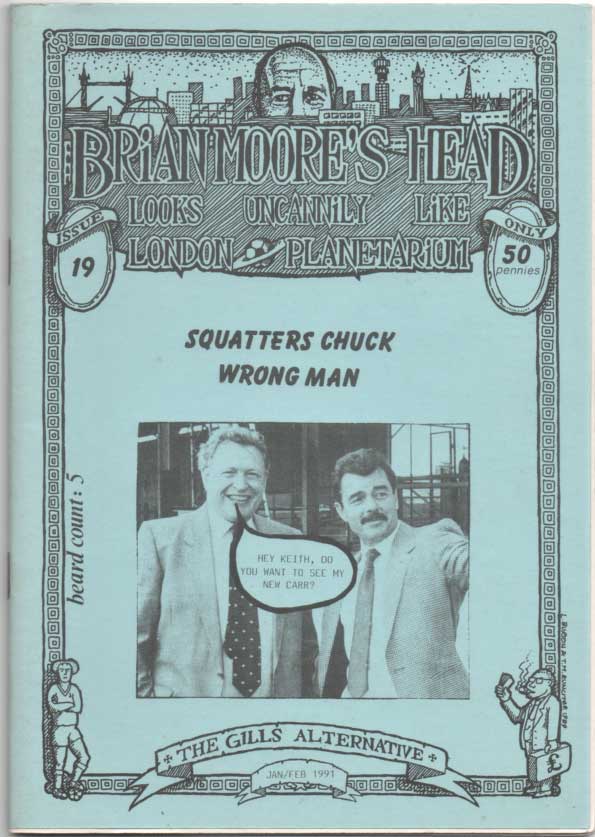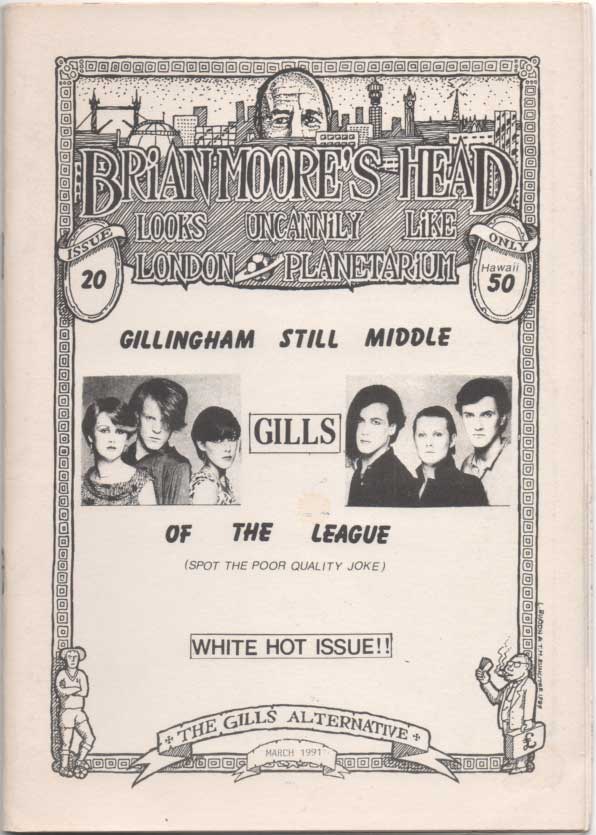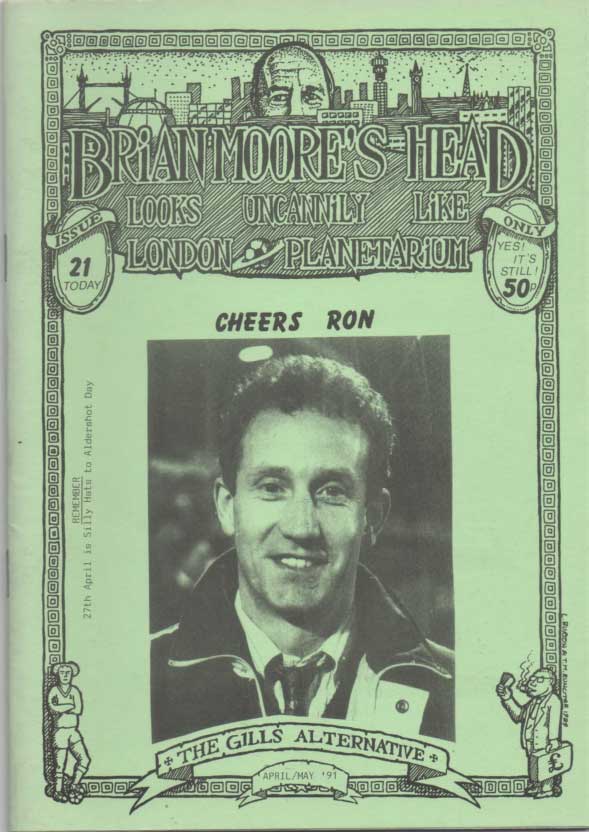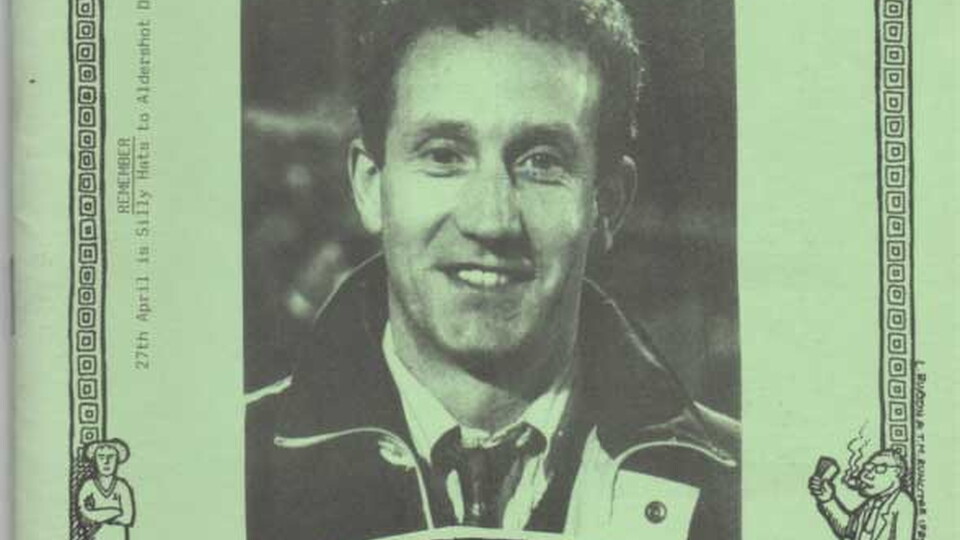Brian Moore’s Head Looks Uncannily Like London Planetarium had been a success story right from its inception in August 1988.
From the humble beginnings of a twenty-page issue costing 40p, the page count of the fanzine had undergone several increases (during which time the price rose by only 10p) and sales dramatically went up, reaching a pinnacle during its second season when 1,200 copies were printed of BM11.
However, at the start of 1991, the first cracks in the BMH empire began to appear, with several issues to face, and not just unsold ones, although they were a concern. The Sportspages bookshop in London’s Charing Cross Road was now taking only 150 copies, as opposed to 200 previously, other outlets were no longer stocking it and we were struggling to shift the publication at home games due to the poor crowds, even when we were selling a new edition for the first time.
BMH19 was launched at the match against Hereford at Priestfield on Saturday 2 February 1991 and sales were sluggish, whilst they were even lower when BMH20 was available for the first time, four weeks later. The drop in the number of copies sold had, of course, affected revenue, and BMH was encountering a cash-flow problem, but one that wasn’t insurmountable.
However, those issues paled into insignificance in comparison to the one that threatened the future of the fanzine, details of which appeared in BMH19, ‘The biggest problem we currently face is that the small group of writers who have sprung forth with the vast majority of articles during the first nineteen issues of our existence are fast running out of ideas. No, surely not, I hear you cry. But, it is true, we have been drained of our creative juices and are struggling to string together more than a couple of coherent pieces each time. Not only this, but the BMH editorial team have become rather disillusioned with the fanzine as a whole in recent months. Therefore, we are appealing to you, the humble reader, to contribute something to your beloved BMH. Get those pens out, get that typewriter out of the loft, learn to write, just send us something. If you don’t think you can write a whole article, just give us the outline of it, and we’ll see what we can do with it. If you want us to carry on, you must help us. As things stand at the moment, we should make it to the end of the season, but after that, well, who knows...’
The appearance of fanzine favourite Kelvin Morton as the referee for our home game against Northampton at the end of December 1990 was covered in issue nineteen, ‘The glorious sight of Kelvin running out to a red card welcome from the Rainham End is something that I will long treasure. I only wish we could have got more of them done. Many thanks to Ian Hancock for providing them, and jolly well done to all those who waved them in a good cause. It has to be said that the man himself entered into the spirit of things, rewarding our faith with a Gills penalty award, and then sending us into uncontrollable mirth by whipping out the genuine article, yes his actual well-used red card, to signify the end of one Northampton player’s afternoon.’ Apparently, both decisions were the correct ones.

There were those in the BMH team who were usually not content to just watch Gillingham games, they often headed to non-league matches in Kent, and Chatham’s visit to Faversham for a morning kick-off on Boxing Day 1990 was a starter for a selection of the fanzine boys, with the main course that afternoon’s clash between Gillingham and Walsall at Priestfield. BMH19 included an account of ‘the morning game at Faversham, whose ground is basically an exposed lay-by on the A2, surrounded by two cow sheds, several ramshackle buildings and a garage.
The rain was lashing horizontally across the pitch, causing bemused seagulls to fly backwards and the old floodlight pylons to lean at sixty-degree angles. A man in a sturdy anorak marched across the pitch with a bag of sawdust, which he sprinkled in the near goalmouth – it was hopelessly inadequate in soaking up the water contained in the six inches of liquid mud. He deposited the rest in three piles at the other end but, before he could distribute it more evenly, it blew off in the direction of Sittingbourne, thus ending the least successful attempt at drying a waterlogged pitch I had ever witnessed.’
The same article also mentioned an incident at the end of our game against the Saddlers, later that day, ‘A bloke leapt over the barrier in the corner of the Rainham End and landed on what he thought was a pile of discarded polystyrene cups, but was actually a two-inch deep river which had formed on the bottom step against the wall, soaking himself up to the knee-caps. Now we have a moat in front of the terraces, can the fences come down?’
The appeal for new contributors had the desired effect and BMH20 benefitted from a more varied selection of writers and styles. The editorial detailed a meeting that had taken place in the Executive Room at Priestfield on Thursday 31 January 1991. Three of the BMH team attended, along with Board members Tony Smith and Barry Bright, various other people representing groups such as the Travel Club and Supporters’ Association, as well as matchday stewards – ‘Quite apart from anything else, the mere fact that such a meeting took place to start with shows that the club genuinely want to talk / listen to supporters, and they should be applauded for it. There are not many clubs who can be bothered with the ordinary fan, aside from taking their money every other week, we can consider ourselves lucky to have one of the more enlightened Boards in the country.’
Topics discussed varied wildly, from the important to the more trivial, the former category including the club’s potential ground move and financial state, with the latter including ‘the flooding of turnstiles, crumbling terraces and the problems associated with allowing women in the tunnel before kick-off that were constantly raised by stewards.’
The meeting lasted two hours and the subject of the removal of the perimeter fencing was brought up. It was obvious that this wasn’t something the club were considering and the issue was quickly glossed over and the subject changed. What did come out from the meeting was that Gillingham Council had no intention of helping the club to find a new site within the area, with ‘suspicions that they would be very pleased to see the back of Gillingham FC’ remaining very strong.
Apparently, both Rochester and Swale Councils were more amenable, ‘so a move out of Gillingham does not necessarily have to mean us losing our roots. However, it was suggested that, should we move out of the Borough, a change of name may be necessary. I believe this would be a serious error, there is a danger of alienating supporters by moving to start with and to erase the club’s identity in this way could only serve to further exacerbate the situation. The club should think long and hard before deciding on this course of action.’

Issue nineteen saw the first in a new series, ‘My First Trip’, with the fanzine asking for contributions to this feature for future editions. The inaugural piece was penned by a fan who had started watching Gillingham home games on a regular basis during the 1978-9 season and saw his first away match towards the end of that campaign. ‘It was during the Easter school holidays that I made my debut on foreign soil. I was staying at a friend’s house in Laindon which, for those of you who are not au fait with the geography of south Essex, is but a short train journey from Southend, up the only line I have seen for matching the dirty, unsafe cattle trucks which BR claims to be for the use of human beings – although a friend from Birmingham once claimed that they got the rolling stock that is considered too worn out for the Charing Cross line.’
The concept of away terraces wasn’t one that had crossed the minds of the Gillingham fan and his friend, and they ended up standing on a covered terrace, with the large away end to their right. There had been a limited display of bravado from the writer, as he was wearing his Gills shirt (the classic Bukta top). However, he did sport a sweatshirt on top of it. ‘I can’t actually recall a great deal about the game itself, except that Southend had a goal disallowed after they took a free-kick without the ref’s permission, and that Gills won with a glorious goal by Danny Westwood. The goal did put us in a rather awkward position. We had twigged early on that it would be wise to keep quiet about our allegiance to the visiting side, which we had managed to do quite successfully, but the sight of Westwood’s goal hitting the back of the net saw half the stand erupt, the away end go nutty and two idiots along the side jumping wildly about.’
The piece ended with, ‘It was only when I later started attending away games on a more regular basis that I realised that they didn’t all end quite as well as this one but, there again, it is surely the fact that it is so difficult to win away that makes it all the sweeter when you do.’
The final issue of BMH published during the 1990-1 season was the twenty-first edition. The editorial reported that the appeal, in BMH19, for more writers had been a success, but that the financial difficulties were continuing. The fanzine should have been increased in price much earlier, but the decision to leave it at 50p for so long was down to the fact that it was a very convenient amount. The editorial stated that the price would go up from the start of the following season and that there were a number of options to consider. It could either become 60p or 70p, but both those amounts would provide problems when selling, what with the more complicated procedure for giving change, ‘Alternatively, we could put the price up to £1. We fully realise that a jump from 50p to a quid is a somewhat drastic step and it is for this reason that we want to canvass the opinion of you, the humble reader.
We should point out that no member of the BMH team has in the past, or will in the future, benefit financially from producing the magazine, in fact the whole thing has been a labour of love these past three years. Obviously, doubling the price will lead to us making a profit. What we intend to do with this money is 1) plough some of it back into the club through kit sponsorship etc and 2) undertake all the projects that have had to be shelved through lack of cash in the last couple of years, such as BMH badges, T-shirts etc. However, we will not take this step if the readership at large object. So, we want you to tell us what you think. We are bound by your opinion, but we won’t know what it is if you don’t tell us.’

Director Tony Smith responded to a letter sent to him from a member of the Capital Gills organisation, and sent a copy of his reply to BMH for publication, which appeared in BMH21. Smith cast his mind back at the two years since he had become a director and ‘considered the positive happenings within the club. The partially restored credibility within the community, the financial stability, even though we still owe £775,000 to the bank, the creditors’ balances that have been reduced from a twelve-month timescale to one month. A sound youth policy which could be the future saviour of the club. A management team that has worked hard behind the scenes with very strict financial guidelines to lay the foundations for hopefully long-term success. A manager (Damien Richardson) who is honest and will stand up and say that he has made a mistake and will not hide behind the directors or the players.’
Smith then filled his brain ‘with negative thoughts. The manager who wishes to strengthen his squad and is frustrated in signing players who want excessive signing-on fees or basic wages far in excess of what any fourth or third division club could afford. Gillingham Council’s reluctance to be fully supportive in our relocation. The bank interest charges of £130,000 and the £100,000 to be found to balance the books by the end of the year. How will we find the £1.2M required to fund the club next year?’ Smith wrote that goalkeeper Ron Hillyard had said to him on several occasions, “What will you get out of it?” and his ‘answer to that question would be the personal satisfaction of hopefully seeing our football club enjoy the success that it deserves.’
Hillyard was given the honour of being on the front cover of BMH21, in appreciation of his playing career with the Gills, that had come to an end, after over sixteen years, when he’d announced his retirement in March 1991 due to a back injury.
